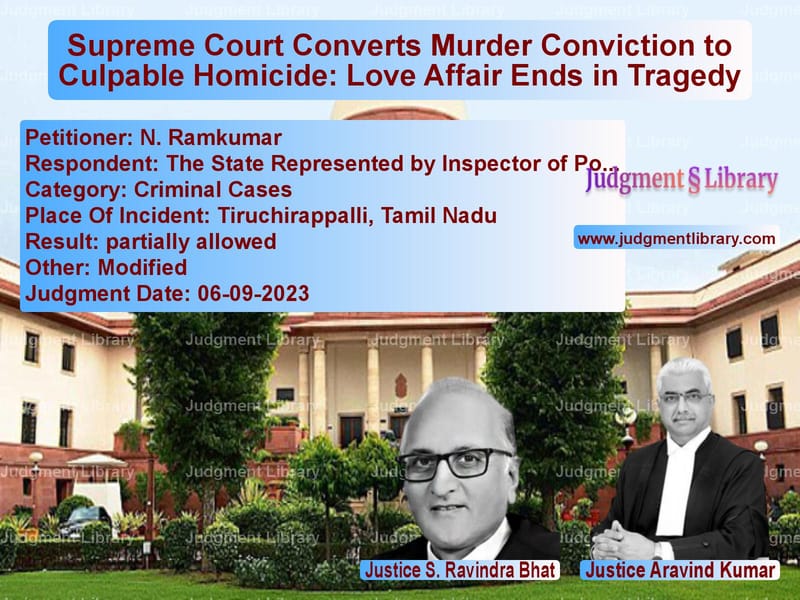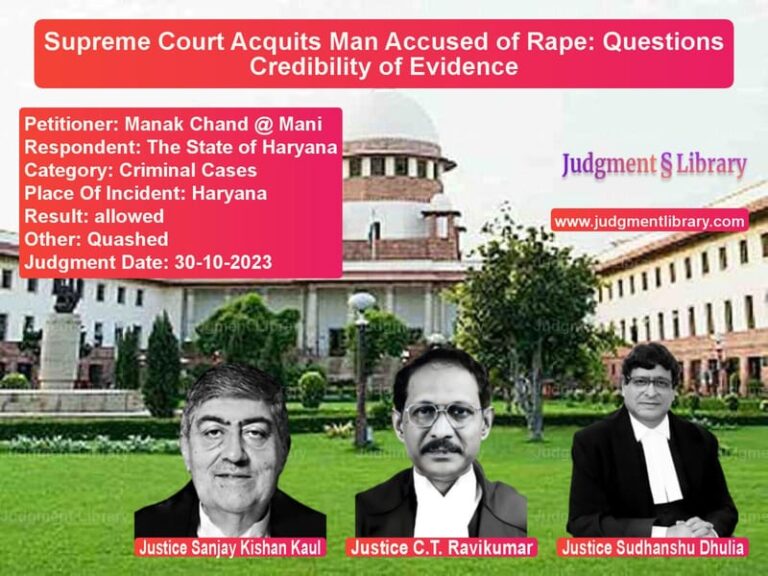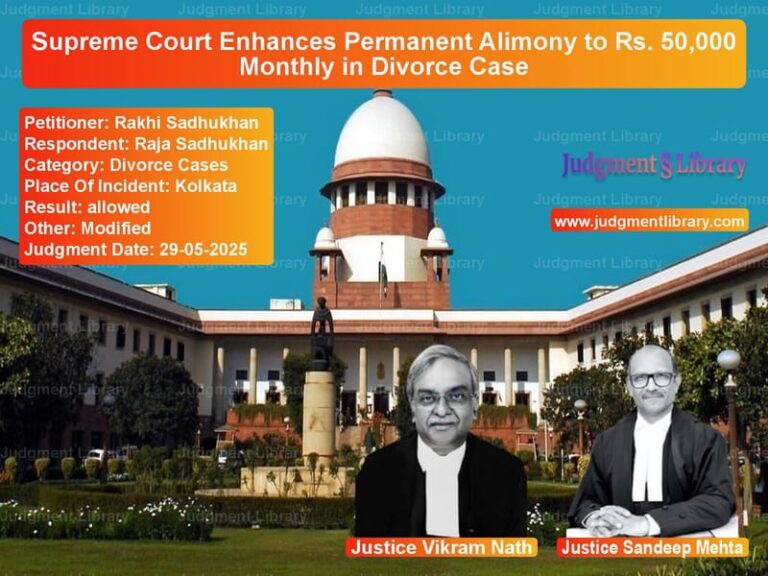Supreme Court Converts Murder Conviction to Culpable Homicide: Love Affair Ends in Tragedy
The Supreme Court in N. Ramkumar vs. The State Represented by Inspector of Police revisited a case of a tragic death arising from a love affair gone wrong. The case involved a young man accused of murdering his lover, leading to a legal battle that resulted in the Supreme Court altering the conviction from murder (Section 302 IPC) to culpable homicide not amounting to murder (Section 304 Part II IPC).
Background of the Case
The incident took place on June 19, 2010, in Tiruchirappalli, Tamil Nadu. The appellant, N. Ramkumar, was in a romantic relationship with the deceased, Sangeetha. However, their relationship had deteriorated, and Sangeetha had begun talking to her neighbor, Sudhakar. This turn of events led to a confrontation between Ramkumar and Sangeetha, resulting in a fatal altercation.
According to the prosecution:
- On the night of June 19, 2010, at around 10:30 PM, Ramkumar trespassed into Sangeetha’s house and confronted her about her association with Sudhakar.
- In a fit of rage, he allegedly grabbed her by the ears and dashed her head against the wall before fleeing the scene.
- Sangeetha was admitted to the hospital but succumbed to her injuries on June 29, 2010.
- The police registered an FIR under Sections 294(b), 448, 323, 506(1) IPC, and later altered the charges to Section 302 IPC after her death.
Legal Issues Raised
The Supreme Court examined the following key legal issues:
- Whether the prosecution had proven beyond doubt that the appellant intended to cause Sangeetha’s death.
- Whether the act constituted murder under Section 302 IPC or fell under culpable homicide not amounting to murder under Section 304 IPC.
- Whether the sentence awarded was proportionate to the crime.
Prosecution’s Arguments
The prosecution contended:
- The appellant had a clear motive—his anger over Sangeetha’s association with Sudhakar.
- The attack was intentional, as he trespassed into her house and assaulted her.
- Eyewitness testimonies from Sangeetha’s mother (PW-1) and uncle (PW-2) confirmed the appellant’s involvement.
- The medical report indicated that the injuries sustained by the deceased were severe and led to her death.
Defense’s Arguments
The defense countered:
- The prosecution’s case was based on circumstantial evidence and had inconsistencies.
- The appellant had no intention to kill; the act occurred in the heat of passion.
- The injuries were not inflicted with a weapon but resulted from a scuffle.
- The medical report suggested that death was due to a head injury, which could have occurred from an accidental fall.
Supreme Court’s Ruling
The Supreme Court analyzed the evidence and ruled that the case did not meet the criteria for murder under Section 302 IPC but fell under Section 304 Part II IPC.
1. Absence of Premeditation
- The Court found no evidence of premeditation or planning.
- The appellant acted in the heat of the moment after an argument.
2. Single Act of Assault
- Unlike planned murders, this case involved a single assault with no repeated blows.
- Had the appellant intended to kill, he would have used a weapon or inflicted multiple injuries.
3. Medical Evidence Did Not Support Intentional Killing
- The post-mortem report showed head trauma but no injuries indicative of an intention to kill.
- Doctors testified that a fall or accidental impact could have caused the injury.
4. Lack of Aggravating Circumstances
- The Court noted that the appellant was in love with the deceased and acted in a fit of rage, rather than with a criminal mindset.
- There was no evidence of prior threats, planning, or extreme brutality.
Final Judgment
The Supreme Court:
- Converted the conviction from Section 302 IPC to Section 304 Part II IPC.
- Sentenced the appellant to the period already undergone.
- Ordered his immediate release if he was not required in any other case.
Impact of the Judgment
This ruling sets an important precedent:
- Distinction between murder and culpable homicide: The Court reaffirmed that not all killings amount to murder; intent plays a crucial role.
- Recognition of emotional impulsivity: The judgment acknowledges that crimes of passion must be treated differently from premeditated killings.
- Fair sentencing approach: The ruling ensures that punishment is proportionate to the crime committed.
Conclusion
The Supreme Court’s ruling in N. Ramkumar vs. The State highlights the importance of intent in determining the severity of a crime. By converting the conviction to culpable homicide not amounting to murder, the Court ensured that justice was served in a balanced manner. This case serves as a crucial reference for understanding the thin line between murder and culpable homicide in Indian criminal law.
Petitioner Name: N. Ramkumar.Respondent Name: The State Represented by Inspector of Police.Judgment By: Justice S. Ravindra Bhat, Justice Aravind Kumar.Place Of Incident: Tiruchirappalli, Tamil Nadu.Judgment Date: 06-09-2023.
Don’t miss out on the full details! Download the complete judgment in PDF format below and gain valuable insights instantly!
Download Judgment: n.-ramkumar-vs-the-state-represente-supreme-court-of-india-judgment-dated-06-09-2023.pdf
Directly Download Judgment: Directly download this Judgment
See all petitions in Murder Cases
See all petitions in Bail and Anticipatory Bail
See all petitions in Custodial Deaths and Police Misconduct
See all petitions in Judgment by S Ravindra Bhat
See all petitions in Judgment by Aravind Kumar
See all petitions in partially allowed
See all petitions in Modified
See all petitions in supreme court of India judgments September 2023
See all petitions in 2023 judgments
See all posts in Criminal Cases Category
See all allowed petitions in Criminal Cases Category
See all Dismissed petitions in Criminal Cases Category
See all partially allowed petitions in Criminal Cases Category







